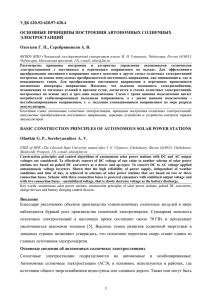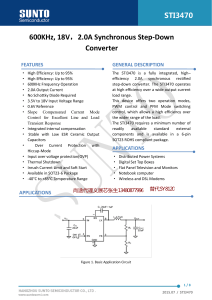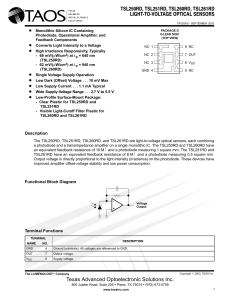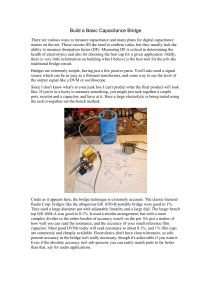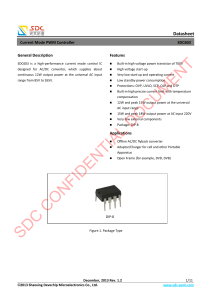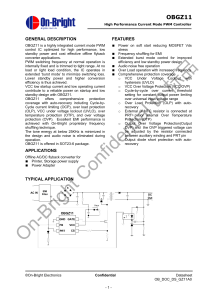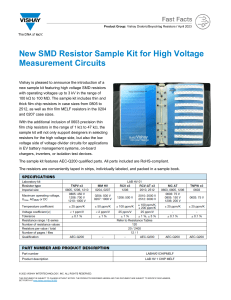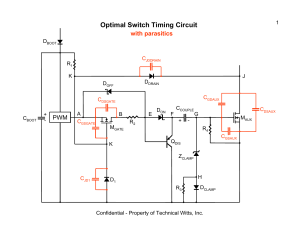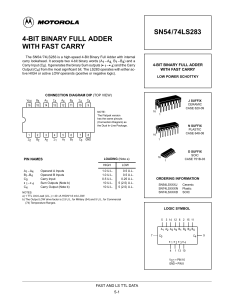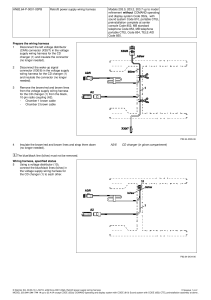I 1 / I
реклама
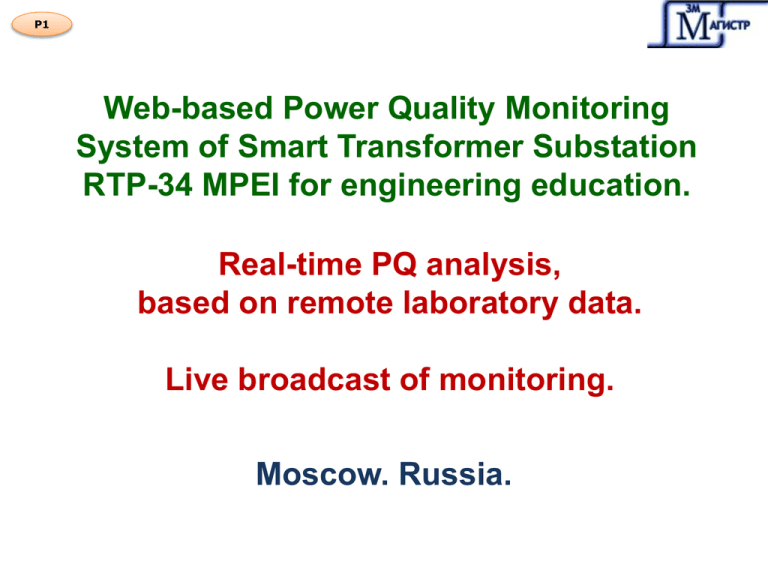
P1 Web-based Power Quality Monitoring System of Smart Transformer Substation RTP-34 MPEI for engineering education. Real-time PQ analysis, based on remote laboratory data. Live broadcast of monitoring. Moscow. Russia. P2 Currently in the field of traditional electricity there are significant changes. These changes include the active use of power electronics, IT-technologies, increased attention to energy saving, development of approaches to create a "smart grid», the integration of the traditional system of power supply of renewable energy and more. There is a mutual penetration of new concepts in energy, information and telecommunication technologies. It is planned to create the next generation of energy systems - intelligent power networks. P3 Intellectualization of electricity poses problems: • Creating a "smart" instrumentation and devices for substations, providing accounting and energy management in conjunction with non-stop monitoring and control of quality of electric power in stationary and transient conditions. • Develop principles for the organization of intelligent distribution transformer substations of 10 / 0.4 kV. • Formation of the concept and testing of fragments of intellectual energy in the form of Micro Smart Grid on the basis of individual power grid structures, located in a small area around MPEI. • Implementation of the Smart Grid concept in the educational process. P4 At MPEI over the past 15 years are working in the direction of energy saving and efficiency of electric power through the introduction of elements of intellectual energy at the facilities of Moscow. We transferred this research experience in electrical engineering education. P5 Features of modern electricity. The increase of non-linear loads since 1960 Structure of energy consumption in USA Private sector Commercial sector Industry Low Voltage (0,4 кV) Low Voltage (0,4 кV) Medium voltage (3-10кV) 37 % 36% 27% IEEE Power&Energy, volume 10, number 3, May/June 2012 Sources of power quality deterioration became institutions, homes, schools, hospitals, etc., mainly because of controlled single-phase rectifiers: compact fluorescent and LED lamps, servers, office equipment, household appliances, switching power supplies installed in the TV , computers etc. It can be argued that the current nonsinusoidality in modern low voltage is mainly determined by the imperfection of the secondary power supply for the equipment. P6 Trends in production of electric energy. ELECTROSAVINGS Reducing the rate of growth of production of EE. The annual increase in production (%) 1949 – 1973 8,3 % 1973 – 2006 2,5 % 2010 – 2030 0,9 % Development of standards use DC in the residential sector. IEEE Power&Energy, volume 10, number 3, May/June 2012 The level of losses in the transmission and distribution of energy in the United States from 1926 to 2007. Reducing losses by 1% every 10 years Losses on the transmission and distribution of energy in the United States account for about 7% (in Russia, according to unconfirmed reports up to 17%). Programm «Smart Grid»: DC in the Home The basis is a well-known fact that there are additional losses in consumer electronic devices. Losses: AC/DC – 17-35% PV/AC – 23-28% Dynamic Pricing One of the main benefits of Smart Grid is to ensure control of the consumption of EE in online 90 % mode by means of access to the real information from the supplier EE and the opportunity to receive information on energy consumption in real time (mode "dynamic tariff», “dynamic pricing”, “penalties”). P7 The modern 0.4 kV power supply network is overloaded by harmonics As a result, in four-wires network with the equality of the phase currents ("load balancing") there are extremely large currents in neutral wire. Typical modern currents Single-phase rectifiers Variable Frequency Drive Phase control (dimmers) P8 Sources of power quality deterioration become institutions, homes, schools, hospitals, etc., due to the non-linear loads (mostly single-phase controlled rectifiers) switching power supplies installed in the TV, computers, servers, compact fluorescent and LED lamps , office equipment and household appliances. P9 The emergence of higher harmonics at the phase control. Simulation of power quality events with 3phase simmetrical non-linear load. load After Fourier analyse nonsinusoidal load current i(t) is represented as the sum of currents 1,3,5,7,9 ... harmonics. Despite the absence of reactive elements in the circuit between the first harmonic of the current i1 (t) and the voltage u (t) phase shift occurs. on=0о off=74,6о on=55о off=90о The shift can be a leading (capacitive), zero (resistive) or lagging (inductive) depending on “On-Off” moments of switching key S. As example, the compact fluorescent lamps and LED lamps the first harmonic current leads first harmonic voltage. on=74,6о off=105,4о In the dimming devices (thyristor) light control first harmonic of current lags behind the first harmonic of voltage. In mentioned cases in three-phase system neutral current contains 3 times harmonics and may exceed the phase current 1.5-2 times. on=105,4о off=180о 1st harmonic Modeling results P10 The emergence of higher harmonics at the phase control. Simulation of power quality events with 3phase simmetrical non-linear load. The dependence of the power factor from the current THD. cos 1 pf 1 THDi 2 pf, cosϕ1 1 0.95 0.9 on 0.85 off THDi,% 0.8 i1(t) iн(t) 0 I1 U(t) U U(t) on=0о off=115о -20o i1(t) iн(t) U U(t) 0o off=130о iн(t) i1(t) U(t) I1 U on=65о off=180о U(t) 20o 40 Iн=100A (rms) I1 = 91A / -20o THD = 42,94% Fr = 34 17 9 9 Kfactor = 3,27 Cosfi = 0,94 Pf = 0,86 Iн=100A (rms) I1 =89A / 0o THD=53,33% Fr=46 8 18 2 Kfactor = 3,58 Cosfi = 1 Pf = 0,88 I1 U(t) on=50о 20 Iн=100A (rms) I1 =91A / 20o THD=42,94% Fr=34 17 9 9 Kfactor = 3,27 Cosfi = 0,94 Pf = 0,86 60 P11 The neutral currents in three-phase network with the single-phase non-linear loads. U(t) i(t) U1(t) Neutral current RMS=144A I1(t) U(t) I1(t) i(t) U(t) i(t) U1(t) Neutral current RMS=144A U1(t) I1(t) PF = P / S = ( I1 / I ) * cos(φ1) Neutral current RMS=173A Modeling results Irms=101,67A I1 =86A / 31o THD=63% 3 harm: 52 / -93o 5 harm : 18 / 79o 7 harm: 18 / -101o 9 harm: 11 / 72o Kfactor = 4,74 PF = 0,73 Cos(fi) = 0,86 Irms=101,67A I1 =86A / -31o THD=63% 3 harm : 52 / 93o 5 harm : 18 / -79o 7 harm : 18 / 101o 9 harm : 11 / -72o Kfactor = 4,74 PF = 0,73 Cos(fi) = 0,86 Irms=100,03A I1 =69A / 0o THD=100,76% 3 harm: 80 / 180o 5 harm: 46 / 0o 7 harm: 12 / 180o 9 harm: 13 / 180o Kfactor = 6,89 PF = 0,69 Cos(fi) = 1 P12 Standard USA ANSI/IEEE C57.110 Non-sinusoidal loads. Additional transformer losses. K1 – heating load К4 – UPS with built-in filter К13 – UPS without filter К20 – variable frequency drive К30 – laboratory equipment P13 "Smart" meter - power quality controller "MAGISTR-430 PQ.“Primary aggregation interval = 10T (200 ms). The device provides continuous monitoring of the main task - get the Online Power Quality Parameters (OPQP). “Online parameters“ means 3 seconds aggregation intervals. Voltages measuring: The limits of the basic reduced (the nominal value of the phase voltage) error ± 0,1% Currents measuring: The limits of the basic reduced (to the nominal value of the phase current) error ± 0,1% Satisfies the Standard IEC 61000-4-30. P14 Online Power Quality Parameters (OPQP) – the base of real-time monitoring. www.magistr.tv/demo Online Parameters appropriate aggregation interval 3 seconds in accordance with IEC 61000-4-30. P15 Online Power Quality Parameters table (OPQP table) Old version L1 - Column with parameters of phase A L2 - Column with parameters of phase B L3 - Column with parameters of phase C Avg/Sum - Column with sum or avg value New version P16 Calculator the contribution of the harmonic components of current. Special calculator of the contribution of the harmonic components is designed to calculate the effective values of the currents in the phase and neutral conductors, the effective value of the harmonic current and harmonic distortion factor Ki (THDi). Source data for calculating values are 1,3,5,7,9 harmonics for each phase. Source data may be entered manually into the cells or copied from real-time data corresponding controller quality. The calculator may include one, two or three buttons of the data request. If the calculator is attached to a single controller, copying of the source data occurs when you press the [Request] button. If the computer is attached to two or three controllers, copying of the source data occurs when you press [1], [2] or [3] button (the numbers correspond to the number keys on the table OPQP on web-map). Pressing the [Calculate] button, the computation of the required phase currents and the neutral conductor and the coefficients is made. Note: Calculated parameters are evaluated taking into account the 1,3,5,7,9 harmonics (in OPQP table they are calculated taking into account all the harmonics up to the 50th). Initial state Source data state Final state P17 WEB-BASED POWER QUALITY MONITORING SYSTEM (WPQMS) The aim of non-stop monitoring is information about electrical parameters of power supply basic elements. Measuring system consists of decentralized synchronized to external time standard measurement tools with remote access via the Internet to Web-technologies. WPQMS is intelligent monitoring system WPQMS provides technical capabilities for the analysis of voltage and current load. For these purposes the harmonic contributions calculator (Fig.6) which makes it possible not only to determine harmonic components and the currents on the neutral conductor, but also to quantify the increase of the cable losses and copper losses in the power transformer. This allows us to estimate (and provide) ELECTROSAVINGS using filters or power supplies with built-in power factor corrector. WPQMS supports various data protocols: CAN, SNMP, ModBus, LonWork etc. In addition the system can be integrated into various devices having a data interface (energy meters, panel meters, PLC controllers, UPS units air-conditioning systems, diesel generator, etc.), which provides: • View the measured OPQP in the form of graphs, waveforms, spectra; preservation of information in graphic and text files; counting the number of voltage sags, surges and voltage pulses; • control standard and emergency events, which are displayed on a special screen forms single-line structural schemes using animation and color changes; • viewing parameters measured in real time, including forms of voltages and currents for the three phases (waveform); • Analysis of the harmonic structure of currents and voltages; • archiving (logging) of the measured parameters; • Creation of power quality indices protocol in accordance with Russian Standard RU GOST 321442013; • count dips and voltage pulses and their representation in the standard ANSI; • preservation of the graphs in graphic files; • e-mail alerts by e-mail, sms. P18 WEB-BASED POWER QUALITY MONITORING SYSTEM (WPQMS) WPQMS is flexible, scalable, and easily integrated into existing control systems. Structurally complex object is a distributed decentralized network peripheral controllers, combined or fieldbus CAN, or through RS-232, RS-485, Ethernet, through which information is exchanged between controllers and data servers. WPQMS allows the connection of devices from other manufacturers under the relevant protocols. WPQMS is addressed to six major categories of professionals: 1. duty electricians; 2. engineering staff service; 3. scientific and engineering staff of specialized organization that helps in the analysis of emergency situations; 4. managers (not electricians) secondary and primary level; 5. students of higher and specialized educational institutions; 6. researchers. Technically WPQMS allows for multi-parameter analysis of modes of load and mains. Additional tool for monitoring computer is the contribution of harmonics, which allows not only to evaluate the currents in the neutral conductor, but also to quantify the increase in cable loss and copper loss of the power transformer. This allows you to define (and provide) the effectiveness of power management when using active filters or power supplies with built-in power correctors. P19 Instrumentation and software for non-stop monitoring of indicators and current power supply quality power supply systems. www.magistr.tv/demo Ethernet InterNET Electrical grid of object #1 The servers for the collection, analysis and storage of information. Ethernet-GSM gateway GRID+NET Clients Ethernet Electrical grid of object #2 Ethernet-GSM gateway Operator workstation at the objects, local storage server. P20 Web-based Power Quality Monitoring System. The architecture of online monitoring of power quality parameters. Servers gathering information Internet Access Meets the requirements of: GOST 32144-2013 (from 01.07.2014) Current measuring transformers IEC 61000-4-7:2008 IEC 61000-4-30:2008 energy Service Managers External Audit System operators Information communication channels Optical fiber, radio channel, GPRS, Internet. measurement means 1 The point of control. Three current, three voltages Voltage measuring transformer Up to 30 control points on a single server. Removal from the server up to 1000 meters (RS232,RS485). Servers gathering information Ethernet 29 30 RS232 RS485 Operator workstation of object P21 WEB-BASED POWER QUALITY MONITORING SYSTEM (WPQMS) Web-map with active filter Active Filter ABB P22 WEB-BASED POWER QUALITY MONITORING SYSTEM (WPQMS) Web-map with active filter THDi levels before and after active filter during 29.04.2015. For demonstration filter was off from 16:00 to 18:00. P23 WEB-BASED POWER QUALITY MONITORING SYSTEM (WPQMS) Web-map with transformer losses. Active power losses in T2, MPEI RTP-34, 22.04.2015 P24 Smart Substation. Fragment of RTP-34 low voltage distribution panel with power quality controllers DM-306M. RTP-34 Low Voltage switchboard. P25 MPEI RTP-34 Live broadcast of online monitoring of current power quality parameters at distributed transformer substation MPEI RTP-34 10/0.4kV; 7000 kVA www.magistr.tv/demo P26 Web-based power quality monitoring system «MAGISTR-3M» Company General Director Lev Khruslov +7 (495) 362-71-92 [email protected] [email protected] www.magistr.tv/demo Thank you. P27 Additional information. P28 P29 P30 P31 P32 Люстра 408 КЛЛ. Источники питания ламп без корректора мощности. Люстра 408 КЛЛ. Источники питания ламп с виртуальным корректором мощности. При наличии корректора мощности энергопотребление и световой поток 8-ми люстр с КЛЛ не изменяются. Потери в фазных проводах снижаются в 2 раза, в нейтральном проводе - в 2000 (!) раз. Существенно улучшаются условия работы защитной и коммутационной аппаратуры. Представленный анализ влияния гармоник на системы освещения можно применить и для других источников света. Например, замена люстр с КЛЛ на традиционные газоразрядные лампы (светильники Армстронг с электронной ПРА), при равенстве коэффициента светоотдачи (лм/Вт), приводит к такому же результату.
